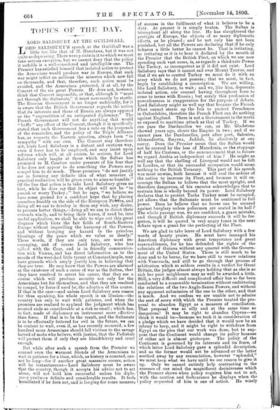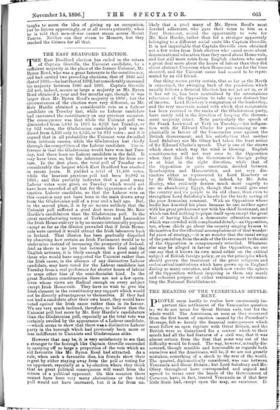TOPICS OF TIIE DAY.
LORD SALISBURY AT THE GUILDHALL.
LORD SALISBURY'S speech at the Guildhall was a little too like that of M. Hanotaux, but it was not quite so depressing. There were points in it to which we must take serious exception, but we cannot deny that the policy it unfolds is a well-considered and intelligible one. The Premier has satisfied himself that isolated action to protect the Arniesians would produce war in Europe, that such war might inflict on millions the miseries which now fall on thousands, and that, therefore, such action must be avoided, and the Armenians protected, if at all, by the Concert of the six great Powers. He does not, however, think that Concert impossible, or that, although it "must act through the Sultanate," it must necessarily be sterile. The Russian Government is no longer unfriendly, for it is aware that the British Government regards the notion that its interests and those of Russia are always opposed as the "superstition of an antiquated diplomacy.' The French Government will not do anything that would " baffle " any effort of the Concert, though it is specifically stated that each Government has a veto on the proposals of the remainder, and the policy of the Triple Alliance has, as respects the Eastern question, always been "in sympathy" with our own. The Concert may therefore act, hints Lord Salisbury in a distant and cautious way, even if force has to be employed, and may insist upon reforms which will, at all events, be serious, for Lord Salisbury only laughs at those which the Sultan has promised to M. Cambon under pressure of his fear that if he does not appear to do something the Powers may compel him to do much. Those promises "do not justify me in forming any definite idea of what measure of practical realisation will be given even to aims so humble." Of the line that action is to take Lord Salisbury gives no hint, while he does say that its object will not be "to punish or worry Turkey ; " but he says, "we believe we have some ground for a confident hope that by placing ourselves frankly on the side of the European Pow'sts, and doing all we can to develop in them any wish, any desire, to procure better things,—doing all we can to direct their counsels wisely, and to bring their forces, if need be, into useful application, we shall be able to wipe out this great. disgrace which blots the fair fields of South-Eastern Europe without imperilling the harmony of the Powers, and without bringing any hazard to the priceless blessings of the peace which we value so dearly." Those words, if they are only true, are most en- couraging, and of course Lord Salisbury, who has tidked with the Czar, and is in friendly communica- tion wiih Vienna, and has direct information as to the moods of the wretched little tyrant at Constantinople, may have grounds which amply justify him in believing that they are true. He may know that the Powers are alarmed at the existence of such a cause of war as the Sultan, that they have resolved to arrest his career, that they see a course which will produce security not only for the Armenians but for themselves, and that they are resolved to compel, by force if need be, the adoption of this course. If that is the case—and unless Lord Salisbury sees reason for thus speaking, his whole speech is an illusion—the country has only to wait with patience, and when the promises are realised to applaud the judgment which has secured ends so considerable at a risk so small ; which has, in fact, made of diplomacy an instrument more effective than force. If that is to be the result, and the Sultanate is to be effectually fettered for evil in the future, we can be content to wait, even if, as has recently occurred, a few hundred more Armenians should fall victims to the savage hatred of mobs who believe, with justice, that the Padishah will protect them if only they are bloodthirsty and cruel enough.
But while after such a speech from the Premier we counsel even the warmest friends of the Armenians to wait in patience for a time, which, as history is counted, can- not be long—for if another great massacre occurs, action will be instantaneous—Lord Salisbury must be aware that the country, though it accepts his advice not to act alone, will not hold him successful unless his diplo- macy produces definite and considerable results. It feels 'humiliated if he does not, and is longing for some measure of success in the fulfilment of what it believes to be a duty. At present it is simply beaten. The Sultan is triumphant all along the line. He has slaughtered the. protiles of Europe, the objects of so many diplomatic efforts, as he pleased ; and he not only has not been punished, but all the Powers are declaring that if he only, behaves a little better he cannot be. That is irritating, as irritating as it is to hear it declared by the mouth of the Premier that the British Fleet, on which we are now spending such vast sums, is, as regards a third-rate Power like Turkey, as incompetent as if it did not exist. Lord Salisbury says that it cannot sail over Mount Taurus, and that if we are to control Turkey we must do it with an army which we do not possess ; that we must, in fact, begin by establishing a conscription. We are willing, like Lord Salisbury, to wait ; and we, like him, deprecate isolated action, our counsel having throughout been to come to terms with Russia ; but surely this profession of powerlessness is exaggeration for the purpose of debate_ Lord Salisbury might as well say that because the French Fleet cannot steam up the Isis to protect Frenchmen in Oxfordshire, therefore the French Fleet can do nothing against England. There is not a Government in the world: so exposed to maritime attack as that of Turkey. If we can pass the Dardanelles we can, as Mr. Gladstone showed years ago, cleave the Empire in two ; and if we cannot pass the Dardanelles, port after port, Salonica, Alexandretta, Smyrna, Jeddah, lie absolutely at our mercy. Does the Premier mean that the Sultan would not be coerced by the loss of Macedonia, or the stoppage of half his Customs, or the announcement that in future we regard Arabia as independent of him ? He might as well say that the shelling of Liverpool would not be felt in London, or that its successful occupation would mean nothing to the British Treasury. This part of his speech was most unwise, both because it will cool the ardour of the nation to increase its Fleet, and because it will en- courage the Sultan to believe that the most upright, and therefore dangerous, of his enemies acknowledges that to. restrainhim is wholly beyond its power. Lord Salisbury declares that to protect Turks Turkey must be occupied, yet allows that the Sultanate must be continued in full power. Does he believe that no house can be secured against burglary unless policemen are seated in its hall ? The whole passage was, we are confident, a grave mistake, and though if British diplomacy succeeds it will be for- gotten, it will be quoted in very angry tones in the next debate upon a grant for the perfecting of the Fleet..
We are glad to take leave of Lord Salisbury with a few- words of hearty praise. He must have managed his American diplomacy with great temperance and great reasonableness, for he has defended the rights of the colonists of Guiana without any quarrel with the Govern- ment of the United States. There is still much to be done and to be borne, for we have still to renew relations with Venezuela, and still to go through that process of arbitration which so seldom results in a verdict for Great Britain, the judges almost always holding that as she is so rich her poor neighbours may as well be awarded a little. Still, a very difficult and complicated affair has so far been conducted to a reasonable termination without embittering the relations of the two Anglo-Saxon Powers, and without any apparent submission of the one to the other, and that is much. And we confess we are unable not to admire the sort of scorn with which the Premier treated the pro- posal to abandon Egypt as a measure of conciliation. That proposal was so silly and at the same time so dangerous! It may be right to abandon Cyprus—we think it would be—because we took it in consideration of a pledge which we have decided that it would now be an infamy to keep, and it might be right to withdraw from Egypt on the plea that our work was done, but to sup- pose that the Continent would change its policy because of either act is almost grotesque. The policy of the Continent is governed by its interests and its fears, of which latter Lord Salisbury gave a splendid description, and as the former would not be advanced or the latter soothed away by any renunciation, however "splendid," we must keep what we have until we see reason to give it up. Only we cannot entirely help contrasting in the recesses of our mind the magnificent decisiveness which the Premier shows when policy requires him not to act, with the caution and forbearance he displays when the policy requested of him is one of action. He wisely laughs to scorn the idea of giving up an occupation, but he listens approvingly, or at all events patiently, when he is told that men-of-war cannot steam across Mount Taurus. Neither can they steam to Moscow, but they reached the Crimea for all that.







































 Previous page
Previous page